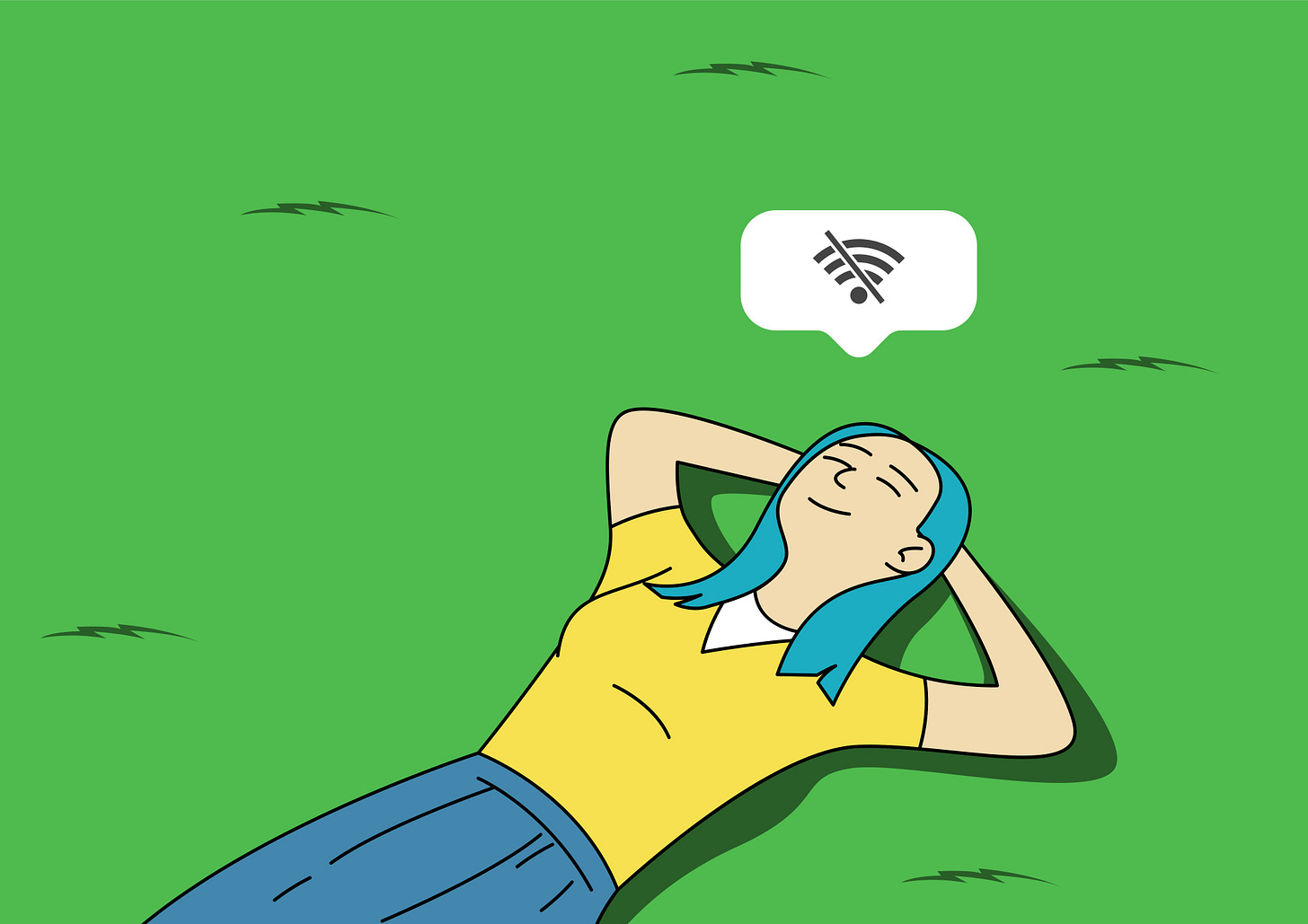When rest feels wrong
Why you need to know about 'deceleration' as the key to easing in to rest
The other evening, after a stretch of deadlines and back-to-back work, I told myself: Tonight, I’m NOT working. Tonight is all about rest.
It sounds simple enough, but in practice it felt almost unbearable. I don’t usually work evenings, but the weeks had been so packed that…well, you know, ‘needs must’, and I’d slipped into late-night laptop sessions (often joined by my husband who was going through a very busy period at work).
I put the kids to bed and walked straight past my laptop, instead of taking a seat at my desk for an evening slog. I sat on the sofa and found myself twitching with restlessness, fighting the pull to just ‘get ahead of tomorrow’ or ‘just do a tiny bit more’.
It was like my body didn’t know what to do with stillness. The stillness I’d worked so hard to learn to embrace felt alien and acutely uncomfortable. I turned on the TV, but it did little to drown out the sound of my racing thoughts.
Wow, I thought. Those old stories had crept back quickly: Productivity equals worth, busyness equals value, rest equals laziness. These are beliefs I’ve worked hard to unlearn, and yet they still rise to the surface the moment I slow down.
Underneath those stories was something even more telling…my nervous system simply didn’t know how to land. I kept noticing myself take these deep, involuntary sighs, the kind your body forces out when it realises you’ve been holding your breath for far too long. It was as if my body was saying: ‘You’ve been going and going, and now you’re asking me to stop, but I don’t know how’.
Counterfeits of rest
As I sat with the discomfort, I wrote out these words…
When depletion becomes your default, you forget that life was meant to feel anything but heavy.
You mistake collapse for rest, busyness for purpose, stress for productivity. You call numbness peace, adrenaline energy, self-abandonment love.
But these are counterfeits of joy. Your body isn’t asking you to do more… it’s ushering you to stop mistaking survival for living.
What if thriving isn’t about doing more, but about finally feeling safe enough to do less… allowing rest to be part of the journey, not something you postpone until you’ve proved yourself?
And I realised that the discomfort I felt was not a sign that rest was wrong. It was a sign that I had been moving so fast for so long that my nervous system had forgotten the language of slowing down.
And I suddenly realised, what I needed wasn’t just rest, I needed deceleration.
Why the nervous system resists rest
This is where the body makes so much sense once you understand it. The nervous system is not a machine that flips from ‘on’ to ‘off’. It’s more like a river. When you’ve been racing along in the current of adrenaline, you can’t suddenly expect the waters to go still!
Here’s what’s happening:
When you’re in sympathetic arousal (fight or flight) your body is primed for action. Your heart rate, breath, and even digestion adjust to keep you moving. That’s why stillness can feel almost itchy, unbearable. Your body doesn’t trust it’s safe to stop.
Each time you tick a task or cross something off a list, your brain gets a little hit of dopamine. It’s the neurochemical of anticipation and reward. That’s why productivity can feel addictive, and stopping feels uncomfortable, because it’s a form of withdrawal!
Layered on top are the old beliefs and narratives: ‘If I stop, I’ll fall behind. If I rest, I’m lazy. If I slow down, I’ll lose momentum’. These beliefs have often been rehearsed since childhood, and they rush in quickly to fill the silence.
So when rest feels wrong, it isn’t failure. It’s physiology. Your nervous system is still running at speed.
Deceleration…the missing piece
This is why deceleration matters so much. Rest isn’t about switching off instantly, instead it’s about creating a bridge between urgency and ease. Without deceleration, you end up either pushing through or collapsing. Or feeling guilty for doing something so needed, that it devalues the act itself. With deceleration, you give your body the chance to shift gears and arrive gently.
Think of it like driving. When you’re hurtling down the motorway, you don’t slam the brakes and expect the car to stop smoothly. You ease off the accelerator. You move lanes, you notice your hands soften on the wheel, and the scenery come into clearer view. Deceleration is what lets you slow safely.
Five ways to practise nervous system deceleration
1. Name it
Instead of labelling yourself as someone who’s ‘bad at resting,’ try telling yourself the truth: This is my nervous system catching up. The discomfort isn’t proof I don’t need rest; it’s proof I do. Naming this truth removes shame and creates compassion.
2. Create transitions
Don’t leap from full throttle into stillness. Create bridges. You can do this bby dimming the lights, drinking a soothing herbal tea to create that transition. Maybe you step outside and feel the air, or play a particular song. These rituals tell the nervous system: we are moving from one state into another.
3. Use your breath
Notice if you’ve been holding your breath or sighing heavily. Try breathing in for four, out for six. Longer exhales cue the vagus nerve, which signals safety. Over time, the body learns these cues to decelerating and softening.



